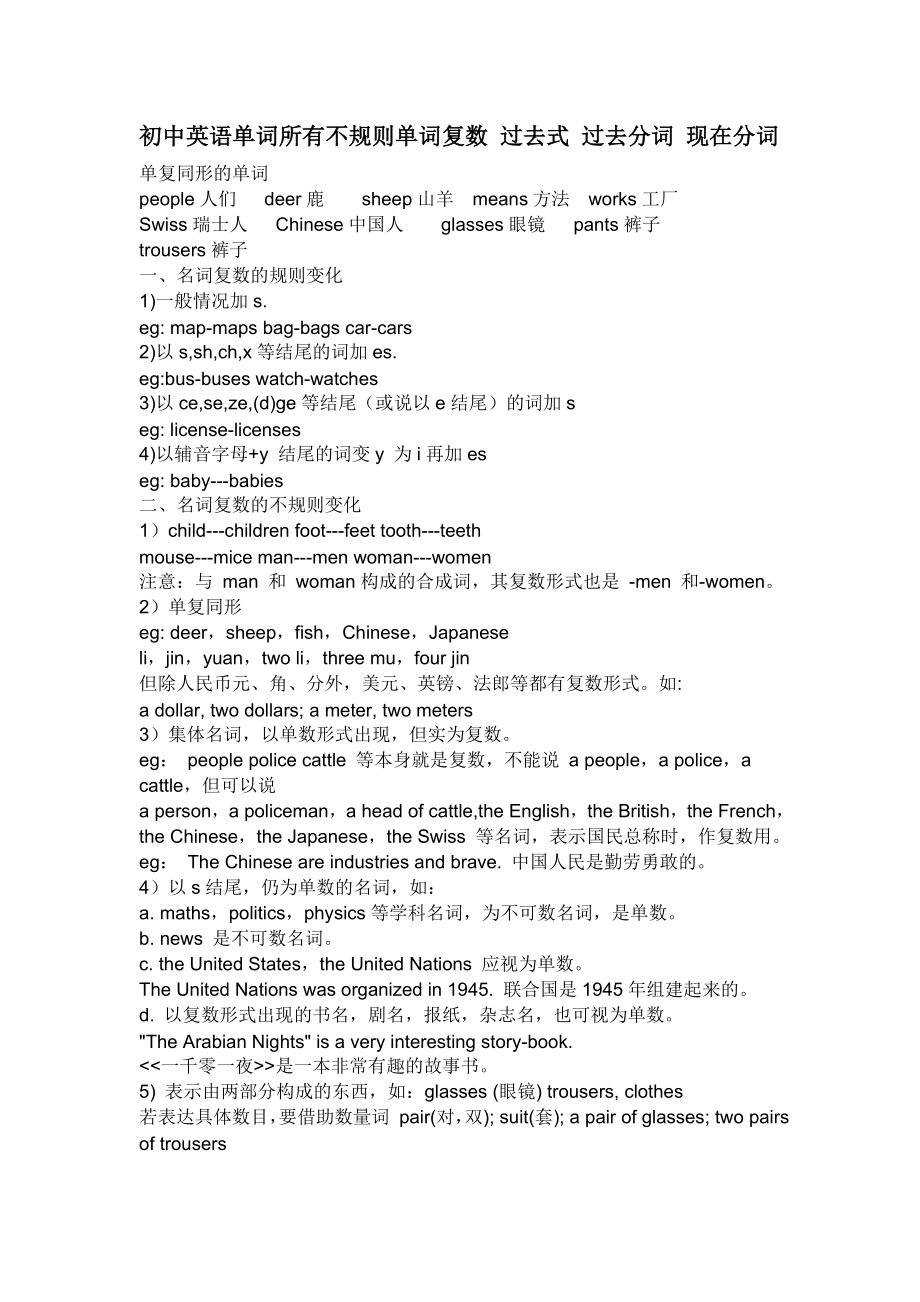《初中英語單詞所有不規(guī)則單詞復(fù)數(shù)過去式過去分詞現(xiàn)在分詞.doc》由會(huì)員分享�����,可在線閱讀�,更多相關(guān)《初中英語單詞所有不規(guī)則單詞復(fù)數(shù)過去式過去分詞現(xiàn)在分詞.doc(2頁珍藏版)》請(qǐng)?jiān)谘b配圖網(wǎng)上搜索�����。
1�����、初中英語單詞所有不規(guī)則單詞復(fù)數(shù) 過去式 過去分詞 現(xiàn)在分詞單復(fù)同形的單詞people人們 deer鹿 sheep山羊 means方法 works工廠 Swiss瑞士人 Chinese中國(guó)人 glasses眼鏡 pants褲子trousers褲子 一、名詞復(fù)數(shù)的規(guī)則變化 1)一般情況加s. eg: map-maps bag-bags car-cars 2)以s,sh,ch,x等結(jié)尾的詞加es. eg:bus-buses watch-watches 3)以ce,se,ze,(d)ge等結(jié)尾(或說以e結(jié)尾)的詞加s eg: license-licenses 4)以輔音字母+y 結(jié)尾的詞變y 為i再加
2�、es eg: baby-babies 二、名詞復(fù)數(shù)的不規(guī)則變化 1)child-children foot-feet tooth-teeth mouse-mice man-men woman-women 注意:與 man 和 woman構(gòu)成的合成詞�����,其復(fù)數(shù)形式也是 -men 和-women�。 2)單復(fù)同形 eg: deer,sheep����,fish,Chinese�����,Japanese li���,jin,yuan�,two li,three mu��,four jin 但除人民幣元���、角����、分外,美元�、英鎊、法郎等都有復(fù)數(shù)形式�。如: a dollar, two dollars; a meter, two meter
3、s 3)集體名詞����,以單數(shù)形式出現(xiàn),但實(shí)為復(fù)數(shù)���。 eg: people police cattle 等本身就是復(fù)數(shù)����,不能說 a people���,a police���,a cattle,但可以說 a person����,a policeman�,a head of cattle,the English����,the British,the French��,the Chinese����,the Japanese,the Swiss 等名詞�����,表示國(guó)民總稱時(shí)�����,作復(fù)數(shù)用��。 eg: The Chinese are industries and brave. 中國(guó)人民是勤勞勇敢的���。 4)以s結(jié)尾�����,仍為單數(shù)的名詞����,如: a. maths�,
4、politics�,physics等學(xué)科名詞,為不可數(shù)名詞����,是單數(shù)。 b. news 是不可數(shù)名詞����。 c. the United States,the United Nations 應(yīng)視為單數(shù)���。 The United Nations was organized in 1945. 聯(lián)合國(guó)是1945年組建起來的�����。 d. 以復(fù)數(shù)形式出現(xiàn)的書名����,劇名,報(bào)紙��,雜志名�,也可視為單數(shù)。 The Arabian Nights is a very interesting story-book. 是一本非常有趣的故事書�。 5) 表示由兩部分構(gòu)成的東西,如:glasses (眼鏡) trousers, clothes
5����、 若表達(dá)具體數(shù)目,要借助數(shù)量詞 pair(對(duì)��,雙); suit(套); a pair of glasses; two pairs of trousers 6)另外還有一些名詞����,其復(fù)數(shù)形式有時(shí)可表示特別意思,如:goods貨物��,waters水域�����,fishes(各種)魚 三、 1)當(dāng)there be 句型的主語是一系列事物時(shí)����,謂語應(yīng)與最鄰近的主語保持一致�。 There is a pen, a knife and several books on the desk. There are twenty boy-students and twenty-three girl-students in the
6、 class. 2)當(dāng)either or 與neither nor�, 連接兩個(gè)主語時(shí),謂語動(dòng)詞與最鄰近的主語保持一致��。 如果句子是由here, there引導(dǎo)���,而主語又不止一個(gè)時(shí)��,謂語通常也和最鄰近的主語一致���。 Either you or she is to go. Here is a pen, a few envelops and some paper for you. 3)當(dāng)主語后面跟有with, together with, like, except, but, no less than, as well as 等詞引起的短語時(shí),謂語動(dòng)詞與前面的主語一致����。 The teacher tog
7、ether with some students is visiting the factory. He as well as I wants to go boating. 四����、謂語需用單數(shù) 1) 代詞each和由every, some, no, any等構(gòu)成的復(fù)合代詞作主語,或主語中含有each, every, 謂語需用單數(shù)。 Each of us has a tape-recorder. There is something wrong with my watch. 2) 當(dāng)主語是一本書或一條格言時(shí)�,謂語動(dòng)詞常用單數(shù)。 The Arabian Night is a book known to lovers of English. 是英語愛好者熟悉的一本好書�。 3) 表示金錢,時(shí)間�����,價(jià)格或度量衡的復(fù)合名詞作主語 時(shí)��,通常把這些名詞看作一個(gè)整體����,謂語一般用單數(shù)。(用復(fù)數(shù)也可�,意思不變。) Three weeks was allowed for making the necessary preparations. Ten yuan is enough
 初中英語單詞所有不規(guī)則單詞復(fù)數(shù)過去式過去分詞現(xiàn)在分詞.doc
初中英語單詞所有不規(guī)則單詞復(fù)數(shù)過去式過去分詞現(xiàn)在分詞.doc

